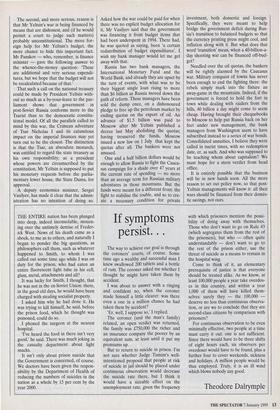If symptoms
persist.. .
THE ENTIRE nation has been plunged into deep, indeed inconsolable, mourn- ing over the untimely demise of Freder- ick West. News of his death came as a shock, to me as to others, and naturally I began to ponder the big questions, as philosophers call them, such as whatever happened to Smith, to whom I was called out some time ago while I was on duty for the prison, who had eaten an entire fluorescent light tube in his cell, glass, metal, attachments and all?
It was lucky for Smith, I thought, that he was not in the ex-Soviet Union: there, in the good old days, he would have been charged with stealing socialist property.
I asked him why he had done it. He was trying to kill himself, he said, before the prison food, which he thought was poisoned, could do so.
I phoned the surgeon at the nearest hospital.
`I've heard the food in there isn't very good,' he said. There was much joking in the casualty department about light snacks.
It isn't only about prison suicide that the Government is concerned, of course. We doctors have been given the respon- sibility by the Department of Health of reducing the numbers of suicides in the nation as a whole by 15 per cent by the year 2000. The way to achieve our goal is through the coroners' courts, of course. Some time ago a wealthy and successful man I knew swallowed 200 tablets and a bottle of rum. The coroner asked me whether I thought he might have taken them by accident.
I was about to answer with a ringing and confident no, when the coroner made himself a little clearer: was there even a one in a million chance he had taken them by accident?
`Er, well, I suppose so,' I replied.
The coroner (and the man's family) relaxed, an open verdict was returned, the family was £750,000 the richer and an insurance company the poorer by an equivalent sum, at least until it put my premiums up.
But to return to suicide in prison. I'm not sure whether Judge Tumim's well- intentioned proposal that people at risk of suicide in jail should be placed under continuous observation would decrease the suicide rate there, but I think it would have a sizeable effect on the unemployment rate, given the frequency with which prisoners mention the possi- bility of doing away with themselves. Those who don't want to go on Rule 43 (which segregates them from the rest of the prisoners), but who — often quite understandably — don't want to go to the rest of the prison either, use the threat of suicide as a means to remain in the hospital wing.
Come to think of it, an elementary prerequisite of justice is that everyone should be treated alike. As we know, at least 100,000 people a year take overdos- es in this country, and within a year 1,000 of them will have killed them- selves: surely they — the 100,000 deserve no less than continuous observa- tion, or are we to conclude that they are second-class citizens by comparison with prisoners?
For continuous observation to be even minimally effective, two people at a time must carry it out: one is not sufficient. Since there would have to be three shifts of eight hours each, six observers per overdoser would have to be found, plus a further four to cover weekends, sickness and holidays. A million people would be thus employed. Truly, it is an ill wind which blows nobody any good.
Theodore Dalrymple


















































 Previous page
Previous page